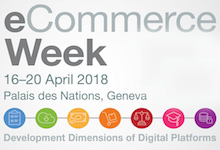Platform-based e-commerce: What is at stake for MSMEs?
16 Apr 2018 11:30h - 13:00h
Event report
[Read more session reports from the UNCTAD E-Commerce Week 2018]
This session explored the opportunities and challenges for micro, small and medium sized enterprises (MSMEs) in developing countries to meaningfully use the possibilities of e-commerce platforms. Moderator Ms Roxana Radu (Programme Manager, Geneva Internet Platform, and Internet Governance Associate, DiploFoundation) highlighted the pervasiveness of online platforms in today’s economy, and the need for a more critical discussion about their role for developing economies. She identified a number of questions that need to be properly addressed, related to the business models of e-commerce platforms, their effects on competition and rule-setting, the shortcomings of social media platforms as marketplaces, possible alternatives to large e-commerce platforms, and the integration of emerging technologies and their effects on MSMEs.
Mr Julien Grollier (Programme Officer, CUTS International) provided an overview of some of the key opportunities and obstacles of platforms for the participation of MSMEs in cross-border e-retail. Platforms are cheap and easy to use, they provide access to buyers globally, they often take care of the end-to-end process – including packaging, shipping, and payments – they provide data analysis tools, and can contribute to the MSMEs’ reputation and consumer trust. Yet, while there is a clear interest for MSMEs to play a more meaningful role in cross-border commerce, they are often still lagging behind. MSMEs from developing countries are often not eligible to register with a platform: platforms can impose restrictions related to the country of origin of the seller, the size of the business, and the bank account and currency used by the seller. On top of that, there are additional bottlenecks related to documentation requirements, cross-border product restrictions, poor infrastructure, and a lack of consumer trust depending on the origin of the seller. To mitigate these challenges, MSMEs could create their own websites, or rely on social media or regional platforms, although it should be noted that these alternatives generate their own constraints and challenges as well.
Focusing on e-commerce platforms for rural development, Ms Marie Sicat (Associate Economic Affairs Officer, ICT Policy Section, Division on Technology, United Nations Conference on Trade and Development (UNCTAD)) explained how e-commerce platforms could mitigate some of the specific challenges phased by those living in rural areas, which are difficult to access, sparsely populated, and are often characterised by low levels of infrastructure, capacity, and resources. Platforms provide a large potential consumer market, save time and transportation costs, and overcome geographical reach constraints. At the same time, it is often difficult for MSMEs to make full use of these opportunities due to the high costs for logistics, weak ICT access and skills, and a general lack of resources. Sicat demonstrated the potential of platforms by providing two examples of rural areas – in China and South Korea – that have been able to greatly benefit from e-commerce through online platforms. Sicat closed her presentation by explaining that e-commerce platforms constitute one of the pillars of UNCTAD’s E-commerce Assessment and Enabler Framework.
Ms Marion Jansen (Chief Economist, International Trade Centre) presented the ‘box and ladder theory’ in which traditional business is confined to a box. Business owners are constrained by geography, limiting the capacity, demand, and reach of their companies. E-commerce helps companies to move out of the box, and while the traditional limitations vanish, companies now face the challenge of becoming visible in the crowd of thousands of online enterprises. In order to be seen, you need to either be tall (e.g. have a great product or resources) or to get a ladder (learn to use tools, such as search engines, platforms, and social media). In this sense, online platforms can be seen as a ladder for MSMEs to be able to access the international market. Jansen explained that there are still a lot of complexities related to platform business models, and that the ‘devil is in the detail’. She suggested adopting a comprehensive approach to identify the challenges systematically, and presented the matrix developed by the ITC, which maps the four stages of the e-commerce value chain (establishing an online business; international e-payment; cross-border delivery; and after sales) to three layers (firm-level capabilities, immediate business ecosystem, and the national environment).
Ms Marilia Maciel (Digital Policy Senior Researcher, DiploFoundation) provided an overview of the potential influence of emerging technologies on e-commerce, focusing on the inter-connected developments in the Internet of Things (IoT), big data, and artificial intelligence (AI). She provided examples of how these technologies will affect society, and how they are already being introduced by e-commerce platforms. For example, IoT is used for logistics, tracking, inventory management and predictive maintenance, while big data analytics can enhance pricing agility and personalisation, and AI is able to automate the entire e-commerce experience. These developments raise important questions: will platforms take into account small producers when adopting such strategies? In addition, how can MSMEs keep up with such technological developments, considering that the ladder – identified by Jansen – might be a ‘moving target’?
During the discussion that followed, participants asked questions related to the incorporation of shipping lines and port operators in discussions about e-commerce platforms, the consequences of De Minimis tax rule for e-commerce, the needs for capacity building, and the effects of digitalisation on employment.
By Barbara Rosen Jacobson
Related event

